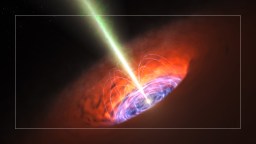There’s something fundamental we all need to understand about dark matter—it may not actually be matter at all. Neil deGrasse Tyson has a bone to pick with this misnomer that is distracting physicists and the public from the real discoveries to be made. Scientists know very little about “dark matter”, and in fact it can only be observed indirectly by its effect on other objects. Tyson has a few suggestions for its re-naming: how about “Fred”, he jokes, which is a name devoid of any implied meaning—suitable for our current level of knowledge. But if you want it to sound sexy and be accurate, then the way to go is dark gravity, according to Tyson. Why? Because when you add up everything in the universe—the stars, moons, gas clouds, black holes, everything—85% of gravity is unaccounted for. That is so-called “dark matter”. What makes it so interesting isn’t the wild-goose-chase question of whether or not it exists, but why it doesn’t interact with ordinary, known matter? On the way to explaining that dark matter “doesn’t give a rats ass about us,” Tyson explores ghost particles, the essence of objects, and why we haven’t found any dark matter planets. Tyson’s new book is Astrophysics for People in a Hurry.
Neil deGrasse Tyson: The question isn't about whether dark matter exists or not. What's going on is, when we measure gravity in the universe—the collective gravity of the stars, the planets, the moons, the gas clouds, the black holes, whole galaxies—when we do this, 85 percent has no known origin. So it's not a matter of whether dark matter exists or not, it's a measurement—period.
Now, “dark matter” is not even what we should be calling it because that implies that it is matter; it implies we know something about it that we actually don't. So a more precise labeling for it would be “dark gravity.”
Now, if I called it dark gravity, are you going to say: “Does dark gravity really exist?” I'd say yeah, because 85 percent of the gravity has no known origin. There it is. Let's figure out what's causing it.
The fact that the word “matter” got into that word is forcing people to say, “Well I have another idea, I bet it's not matter, it could be something else!”
We're overreacting to a label that overstates our actual insights or knowledge into what it is we're describing. Then I just joke we should just call it Fred. Fred or Wilma, something where there is no reference to what we think it is because in fact we have no idea.
So here's how you actually measure the stuff. In a galaxy, which is the smallest aggregation of matter where dark matter manifests, you look how fast it's rotating and we know from laws of gravity first laid down by Johannes Kepler and then enhanced and given further detail and deeper understanding by Isaac Newton, you write down these equations and say, look how fast it's rotating, you invoke that rotation rate in the equation and out the other side says how much gravity, how much mass should be there attracting you. And the more mass that's there the faster we expect you to be orbiting. That kind of makes sense. So when you do this calculation on a galactic scale, we get vastly more mass attracting you than we actually can detect.
I'm adding up stars, gas clouds, moon, planets, black holes—add it all up. It's a fraction of what we know is attracting you in this orbit, and we cannot detect the rest and so we hand it this title dark matter. Understandably, I suppose. But it implies that we know that it's matter, but we don't. We know we can't detect it in any known way and we know it has gravity, so it really should be called dark gravity.
I think the over–under on what dark matter might be, today, I think we're all kind of leaning towards a family of particles, subatomic particles, that have hardly any ability to interact with the particles we have come to know and love, "ordinary matter". And that would make it matter, dark matter, as we've all been describing it. And it's not a weird thing that you could have a particle that doesn't interact with our particles. Within our own family of particles there are examples where the interaction is very weak or nonexistent. You might have heard of neutrinos, this is a ghost-like particle that permeates the universe and hardly interacts with familiar matter at all, yet it is part of our family of particles that we know exist and that we can detect and interact with. So if we can have an elusive particle that's part of our own familiar family of particles it's not much of a stretch to think of a whole other category of particles where none of them give a rat’s ass about the rest of us, and they just pass right through us as though we're not even there.
Now, here's what's interesting about dark matter: we know it doesn't interact with us except gravitationally. By the way, what do I mean by interact? Does it bind and make atoms and molecules and solid objects? No, it does not interact with us in any important known way. But it also doesn't interact with itself. That's what's interesting. So if it interacted with itself you could imagine finding dark matter planets, dark matter galaxies, because to interact with yourself is what allows you to accumulate and have a concentration of matter in one place versus another. These are the atomic bonds and the molecular bonds that create solid objects. And if particles do not interact with one another, they just pass through, you just have this zone of mass not really doing anything interesting.
So dark matter not only doesn't interact with us, it doesn't interact with itself. And that's why when we find dark matter across the universe it's very diffusely spread out. It's like over here. It's not in this one spot and look at this concentration. No, that's not how that works.
An example of this: What is a rock? It's a collection of atoms and molecules that are stuck together by electromagnetic forces. We don't think of them that way, we just think of them as rocks, but they are held together by forces on the atomic and molecular scale, and they bind together and then we get what we call the solid object called a rock.
If those forces did not work on you as a particle, you have no occasion to bind with any other particle. You have no occasion—you have no ambitions of ever becoming a solid object. It's a different kind of world, that would be.
We would not expect that world to have life as we know it, because life requires an assembly of molecules to turn it into some separate entity distinct from everything else that then has fascinating chemical properties that we call life.







